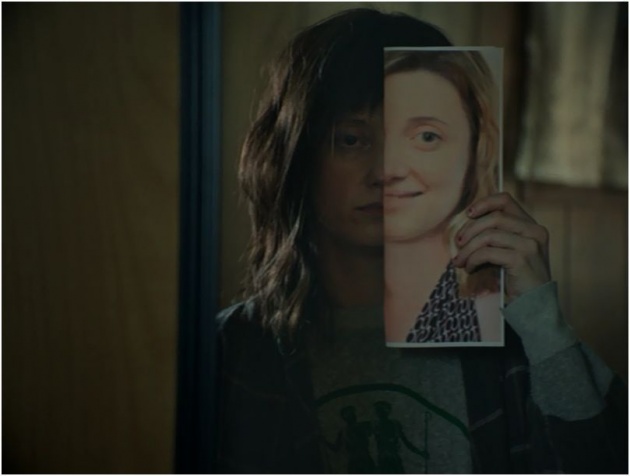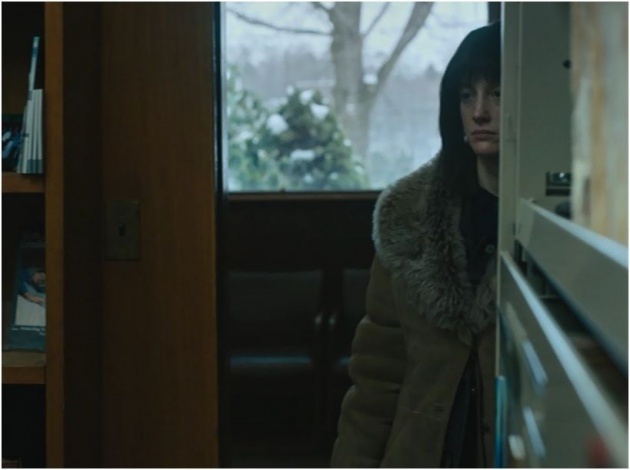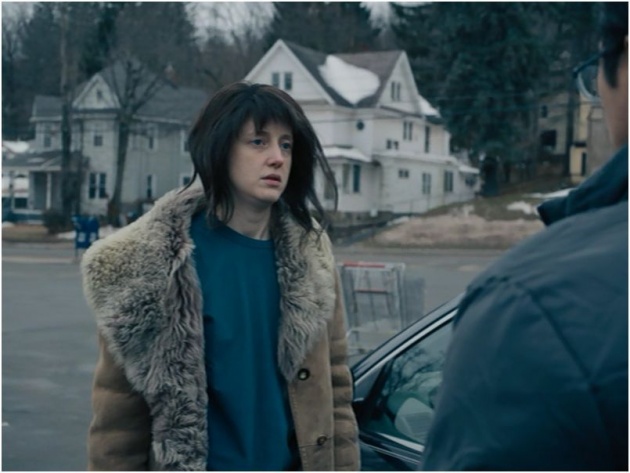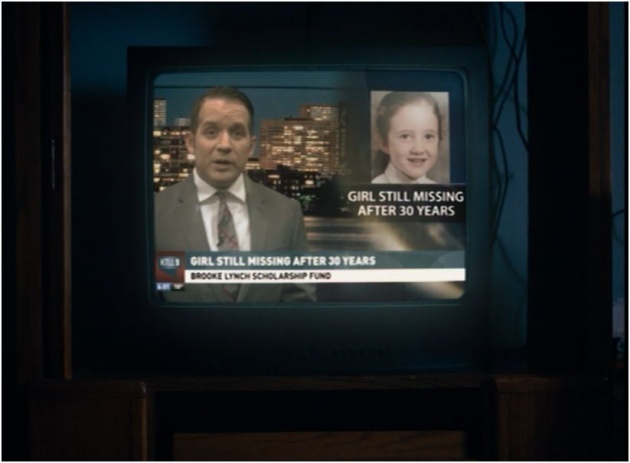
Pictured: Nancy (Andrea Riseborough) imagines herself as missing Brooke Lynch in 'Nancy', an American film written and directed by Christina Choe. Still courtesy of Eon Productions / Studio Canal
Nancy is one of those films that you might think is based on real events. It tells the story of a couple, Leo and Ellen Lynch from Oswego, New York (Steve Buscemi and J Smith-Cameron) whose young daughter Brooke disappeared whilst out shopping thirty years ago. Suddenly they are contacted by a young woman, Nancy Freeman (Andrea Riseborough) who believes she might be their missing little girl.
Naturally, there’s a DNA test.
However, it isn’t based on fact. The writer-director Christina Choe gives us one of cinema’s great or, if you prefer, shabby fantasists, one who doesn’t act with guile but who falls into deception. For Nancy, an online fake identity is as real to her as an offline one. The past is something you tell to yourself before relating it to others. That’s what makes it real.
Nancy knows she has a talent. But it isn’t validated by ‘The Paris Review’. The magazine responds with a note, one of many stuffed into the glove compartment of her car.
We are introduced to Nancy as she looks at her phone. Her mother, Betty Freeman (Ann Dowd) is on the toilet. She has Parkinson’s. She needs help. Nancy is not a natural nurse. Besides, she doesn’t like Betty opening her post. Nancy eats Raisin Bran. They have a cat. Betty is concerned that the family gets applicable benefits. ‘Did you fill out those forms like I told you to?’
Some background: Choe is obsessed by imposters. She had a writing professor who made whopping (do Americans say whopping?) great claims for himself: that he ghost-wrote a Hollywood franchise, that he was a playwright from Ireland. He had the personality of a cult leader – and was a total fraud.
Choe also likes anti-heroes. She might recommend Taxi Driver, Wanda or A Woman Under The Influence – they feature characters who are broken and might never get fixed.

Pictured: First day at a new job. Nancy (Andrea Riseborough) in 'Nancy', an American film written and directed by Christina Choe. Still courtesy of Eon Productions / Studio Canal
For this film, Choe hired women for 80% of the positions behind the camera and 50% people of colour. You make more phone calls, she explained, to address a film set’s gender imbalance.
I should also mention the aspect ratio. It starts narrow, the so-called ‘Academy ratio’ and then gets wider. It represents the expanding of Nancy’s horizons. Like, what if she had a mother who loved her?
We are somewhere in Upstate New York, where the life has been lipo-suctioned out of the people. Nancy temps at Endless Smiles Dentistry. It has a sign: ‘Ignore your teeth and they’ll go away.’ She tells her colleagues that she has holidayed in North Korea. ‘My sister’s been to North Korea. There’s really good shopping,’ says a colleague. ‘That’s South Korea,’ the dentist remarks.
Fact: Choe’s family fled North Korea. Her great uncle was held in a labour camp. She clandestinely filmed a documentary series, Welcome to the DPRK, there.
So what was it like? ‘I went on my own,’ explains Nancy, ‘but they put us in groups.’
Her photographs look faked. I mean, who took them? She is asked what a sign says. ‘I dunno. It’s in Korean.’
Nancy is virtually a Christmas film – minus the lights. Set in January 2017, it is obsessed with child birth, or rather not having a child. Betty, with her shaking left hand, catches Nancy looking at a leaflet entitled ‘Precious Little Baby Girl’.
‘What are you up to?’ She says suspiciously. Then, mollifying her tone: ‘You can still have a baby if you want.’
Choe pays attention to detail. She has Nancy wear a plaster on her thumb, illustrating a repetitive scrolling injury, or at least making scrolling easier. Nancy goes online to converses with Jeb14 (John Leguizamo). She adopts the name Becca. Becca, as we discover, is pregnant. She doesn’t want to keep the baby. But talking to Jeb has changed her mind. Jeb has lost his baby girl. His wife left him. He found Becca’s blog.

Pictured: Nancy (Andrea Riseborough) is confronted by Jeb (John Leguizamo) in 'Nancy', a film written and directed by Christina Choe. Still courtesy of Eon Productions / Studio Canal
If there is one thing that brings Nancy back to earth it is web coverage. ‘You are not connected,’ a cheerful message informs her, ‘and the web isn’t the same without you’.
Having had her message delayed, ‘Becca’ and Jeb agree to meet at Stu’s. ‘What time?’ ‘Coffee time.’ ‘Ha ha ha ha!’ Web chats are the best.
If there is another thing that brings her back to earth it is Betty. Her arm is hurting. ‘I want to get it checked out.’ Nancy serves her scrambled egg. ‘It is part of your symptoms.’ Betty reiterates her request, but Nancy has other plans, ones that she won’t share. After pushing eggs around with her fork, which is exactly how you treat food that has been on a film set for a couple of hours, Betty says, ‘I don’t want this.’
What could be more important than her mother’s health? Answer: painting her hair blacker, applying lip gloss in her car and fastening a fake pregnant belly to her chest. Incidentally, I looked up whether you can buy such a thing. You can. Prices vary from $13 (used) and $80. Some vendors even have a returns policy.
Stu’s diner is like any other roadside diner - functional, a place to stop at after a long drive. Choe shows Nancy entering in long shot. We’re not supposed to identify with Nancy at this point, to want the things that she does. Seeing her small in the frame tells us that.
Jeb is already there. He looks up and is glad to see her. Making conversation, he says that he is surprised she would meet him. He could be ‘a creep from the internet’. How silly – creeps live in apartments not in computers. This is a serious film, so ‘Becca’ simply replies. ‘I could tell you’re not.’
Jeb is looking for guidance, a way out of his grief. ‘Becca’ asks for the name of his daughter.
‘My daughter’s name is Joey.’
However, Jeb responds badly when ‘Becca’ puts her hand on his. ‘Sorry. I just feel I know you.’
‘You don’t,’ smiles Jeb.
There is a telling lunchtime scene. Nancy is having a sandwich and a Diet Coke, a lunch that is easy to prepare but plain and potentially unhealthy. Choe’s camera plans up to show her colleague eating a series of healthy snacks – carrots, grapes, lettuce and a cookie - each one carried in its own Tupperware box. When the colleague crunches a carrot it is practically an accusation. Nancy frowns. However when the dentist pulls a canned drink out of the fridge and takes it into his consulting room, Nancy smiles. She is in good company. It is her Tupperware colleague who is the weird one. This scene takes place without dialogue.
Nevertheless, Nancy wants to assimilate, in her way. She brings Betty some sushi. Betty is watching ‘Oliver Twist’, the 1948 black and white film directed by David Lean, on television. Oliver (John Howard Davies, who grew up to be a television producer) has asked for more. Betty’s left hand shakes.
‘I don’t eat raw fish, you know that. It has mercury in it.’
‘I’ll give it to Stan [the cat] then.’
‘Don’t do that, it’ll make him sick.’
Betty complains that she can’t feel her arm. ‘It has probably gone to sleep,’ Nancy explains. She nestles next to Betty, holding the ‘sleeping’ arm. They continue watching ‘Oliver Twist’, the story of an orphan.
The next day, Nancy wanders around the house, calling out, ‘Mom’. There is no response. She sees that the cat food has been eaten. She goes to Betty’s room and she is lying, open mouthed, very still. After a shocked pause, Nancy closes Betty’s eyes.

Pictured: 'Girl Still Missing After Thirty Years'. A scene from 'Nancy', written and directed by Christina Choe. Still courtesy of Eon Productions / Studio Canal
Interestingly, Choe opens the next scene out of focus, as if to suggest Nancy is in a daze, slowly coming to terms with reality. The shot focuses: Nancy in a hospital reception area, sitting on a green cushioned seat. She speaks to a doctor. ‘Miss Freeman. Your mother has had a severe stroke – it appears she passed away in her sleep.’
Nancy is told that her mother’s Parkinson’s disease increased the risk of a stroke. She is wide eyed, lost. We see her in her car. The lights of passing vehicles are out of focus, only half of Nancy’s face is in shot.
She has been offered a bible - ‘very helpful in the healing process’ – and is asked about the funeral service. Nancy holds her head back, as if in mid-recoil. We see her out walking, walking and smoking – nicotine, possibly helpful in the healing process.
She is on the phone: ‘It’s Nancy Freeman here, Betty Freeman’s daughter.’ There is a jump cut to her sitting up. Then lying back, still on the phone: ‘You went to church with her’. Another jump cut, as Nancy says, ‘I understand.’
Clearing out her mother’s wardrobe, Nancy puts a dress to her chest
Another out of focus shot, this time of Nancy sitting in the kitchen with an open box of Raisin Bran; Stan the cat is nowhere to be seen.
Nancy has to shop. She visits the Great American Shop. A sign in the parking lot reads: ‘For Great American Shoppers only. All others will be towed away at their expense.’
An embarrassing moment occurs when Nancy is seen by Jeb. She had ignored his messages and walks away with buying anything. She explains that she had a sick baby that died before she met him. She pretended so she could help him.
‘Hey’, she says, ‘I really liked you’.
‘You’re sick. Leave me alone.’ Jeb drives off. During this scene, Choe frames Jeb and Nancy against the backdrop of a church. Ironically, they now both share a loss, though of a different kind. However, Nancy’s deception has ruined any chance of a friendship.
Another scene without dialogue: Nancy is clearing out the house when she finds some copies of ‘National Geographic’ magazine. I always found it strange that I have never heard anyone quoting something they have read in ‘National Geographic’ or can name any of the authors of its articles. It wasn’t ‘National Geographic’ than ran John Hersey’s extended essay, ‘Hiroshima’ in its entirety, rather ‘The New Yorker’. Yet ‘National Geographic’ is a recognisable brand, associated with colour photographs of exotic landscapes. I believe ‘National Geographic’ magazine exists entirely on gift subscriptions that have never been cancelled. At any rate, Nancy flicks through a copy. We see a picture of a smiling man holding a boy and another picture of a sailing ship from centuries past. Nancy’s gaze is cold, steady and dead.
In another scene, Nancy reaches out to clasp or almost clasp Stan the cat’s tail. The cat slips away from her grasp. It is another illustration of the difficulty Nancy has in connecting.
Finally, we have what screenwriting tutors call the ‘inciting incident’. On television there is a report on the thirty year anniversary of the disappearance of five year old Brooke Lynch. A mock photo suggesting what Brooke looks like now is shown. Nancy is startled. The girl looks like her. She searches through a folder filled with important documents: the house deed, tax demands, birth certificate. The latter section is empty.
Nancy looks at the picture of woman with blonde hair, enlarging it on her computer screen more and more. She prints it off, folds it in half puts it up to face and looks in the mirror. At this point, the electronic music score kicks into life, introducing a new rhythm, a bit like a telegraph - dot dot, dash dash, also like a John Carpenter soundtrack. It suggests urgency and purposefulness. The camera slowly zooms in as Nancy touches her cheek. She smiles, comparing her smile to that of the photo-aged Brooke.
She calls Brooke’s mother, Ellen. After a false start, she explains: ‘I think my mother might have kidnapped me thirty years ago.’
Ellen puts down the phone in an understandable state of shock
Nancy rings her again. She explains why she thinks she is Brooke – ‘I think my mother hated me.’
‘I want to see a photo of you right now,’ demands Ellen.
Nancy takes a picture of herself with a window in the background, which by the way naturally obscures her features, but I don’t think she does this deliberately.
Nancy is tidying up, putting cartons into a black plastic bag. Mrs Lynch calls her back. ‘As soon as I saw the photo I knew.’ Nancy explains that she can come right away.
‘Leo is in a lot of shock. He thinks we should call the police.’
This is roughly the first third of the film. At this point, we think that Nancy believes that she is the missing daughter. However, when she meets Leo and Ellen, we know that she is making stuff up, stating that she applied for a job in India and then noticed her birth certificate was missing. Then she explains that her mother told her she was adopted from a distant cousin.
Ellen desperately wants Nancy’s story to be true. If anything it would let her and her husband off the hook; that nothing bad happened to her, that she turned out okay. On the other hand if Nancy is lying, her daughter is still out there and she can have no such comfort.
Interestingly, Leo cannot find any trace of this Nancy Freeman on the internet; but we know that she blogged under a pseudonym.
Nancy feels like a short story brought to the screen. We are always slightly outside the action. We cringe when Ellen praises Nancy’s work, saying that she has a real talent, because we know that she only says that because she could be her daughter. When Nancy praises Leo’s photography, it is because she too is reaching out. Unsaid is the notion that photography is no substitute for a missing child. They visit an art exhibition entitled ‘The Thing Is’.
Does Nancy redeem herself? She comes to the aid of a young man after an accident with a hunting rifle. She also cares about her missing cat. Yet in the face of Ellen choosing to believe that she is her daughter, she is frightened. This drives her response at the conclusion of the drama.
For all its attention to detail and a fearless portrayal of a self-embarrassing person, Nancy is a remote viewing experience. Partly this is because we never see Nancy grieving the loss of her mother and coming to terms with her own state. In a sense, she runs before she gets interesting.
Nevertheless, as feature debuts go, Nancy is an assured and confident work that has something to say about the difficulty in filling a void, in coping with emptiness. It transmits the sense of a void on its audience – the winter setting really helps – accounting for a decision to release it as a video on demand in the UK.



